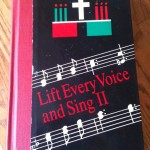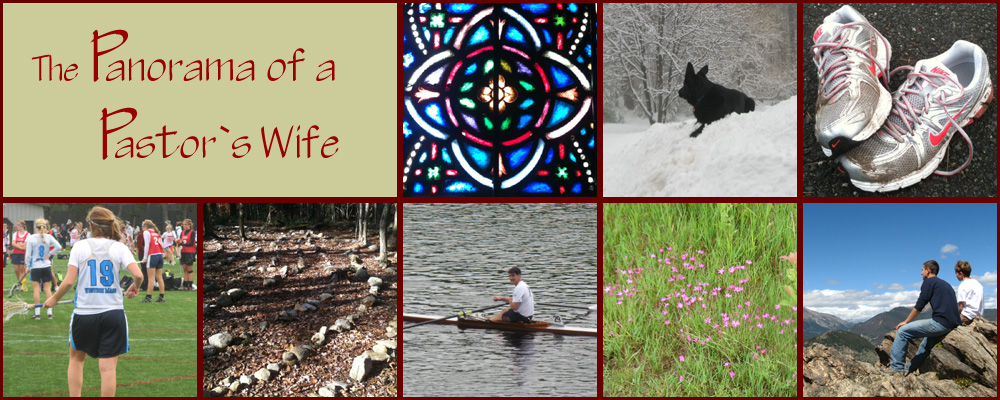Singing in Church
In our house, there’s agreement that Whitney Houston’s best song was definitely not either “I Will Always Love You” or “Greatest Love of All.” Both of these, we think, suffer from weightiness; even as they do showcase the sheer power of the singer’s a voice — they’re just too solemn for our taste. My husband, who has never been known for his moves out on the floor, is absolutely sure that “I Wanna Dance With Somebody (Who Loves Me)” is her best; I lean towards “How Will I Know?” Either way, it’s the joyous beat and the get-up-and-move quality of these two (and a bunch more like them) that gives them staying power almost twenty-five years after they first burst out on the airwaves and thousands of us said, maybe as we put groceries down on the counter or drove across town for an errand, “Who is that?”
All of the retrospectives on the singer’s life that we’ve heard over the past week have, of course, highlighted the fact that she got her singing start in church—New Hope Baptist Church in Newark, New Jersey to be precise. According to this week’s People magazine (you haven’t been reading it?), she knocked everyone’s socks off in church by the age of 14; parishioners there knew that gospel music would be her launching pad to greatness. Last week, The New York Times featured an essay titled “The Pop Goddess Who Fell to Earth” by Jon Caramanica which included this line:
Ms. Houston was R&B’s great modernizer, slowly but surely reconciling the ambition and praise of the church with the movements and needs of the body and the glow of the mainstream. (Arts section, 2/13/2012)
It’s surprising, at least to me, that he uses the word “ambition” in connection with the church, unless he’s talking about giving voice to a kind of yearning for unity with God. Knowing as we do something about her troubles over the last decade, we might wonder whether “the glow of the mainstream” ultimately provided her with anything better than she had in her early days at New Hope. Being gifted with that voice that people have accurately described as “soaring” wasn’t sufficient to keep her aloft. Her songs had a message of reaching high, doing good, loving fully; but she herself came tumbling down.
Whitney Houston has lots of company in the category of “Great Singers Who Started in Church.” Growing up in Georgia during the forties, Little Richard attended another New Hope Baptist Church and was raised on black gospel music. After reaching stardom as a kind of wild man rock n’ roll performer in the fifties, he made a sharp departure from that public life when he had a conversion experience and decided to study, ahem, theology. From then on, his life has been a kind of see-saw between licentiousness and evangelism – a roller coaster ride is really more like it. To quote from a Wikipedia, he has experienced “some difficulty living his ideal of a disciplined Christian life.” He became an ordained minister and has said, apparently still feeling the struggle between two ways of life that he has known, “Although I sing rock ‘n roll, God still loves me.” Now in his late 70’s, he has found some peace.
The Queen of Soul, Aretha Franklin, also has deep roots in gospel music; her father was a minister at a Baptist church in Detroit. While she made a switch to secular R & B (and who isn’t grateful for that?) when she was around 18, she has never really lost contact with her foundation in the church. Shaken by the death of her god-daughter – to whom she once said she would pass her torch – she no doubt sang her heart out at the funeral and brought listeners to a place deep in their souls.
As for the much younger current pop phenomenon Katy Perry — she’s another story entirely. She grew up in a seriously religious home; both of her parents were pastors. She was nourished on white gospel music (a whole different kind) but stayed with it as a performer only for a short time; the secular sirens were calling, and she hasn’t looked back. Along with all of her hits about steamy teenage life, she is marketing two perfumes, called “Purr” and “Meow.” Perry herself has said, “I think when you put sex and spirituality in the same bottle and shake it up, bad things happen.” (Rolling Stone, 8/2010) Everybody knows how annoying spirituality can be…best to keep it in its place.
In the pews of the Episcopal church where my husband serves, there are two  hymnals that we sing from: the standard one — The Hymnal 1982 and a more recent volume drawing from African American gospel music and spirituals called Lift Every Voice and Sing. There has been a growing effort to expand the experience of what church music can and ought to be; my husband is thinking hard about this issue these days, believing that music can provide a valuable means of access to other cultures and faith traditions. I am hearing rumblings about the need for more percussion, so the traditional Western canon better beware.
hymnals that we sing from: the standard one — The Hymnal 1982 and a more recent volume drawing from African American gospel music and spirituals called Lift Every Voice and Sing. There has been a growing effort to expand the experience of what church music can and ought to be; my husband is thinking hard about this issue these days, believing that music can provide a valuable means of access to other cultures and faith traditions. I am hearing rumblings about the need for more percussion, so the traditional Western canon better beware.
I don’t think any of us want to hear the same music in church as we listen to at home. Aretha’s “Who’s Zoomin’ Who” would sound mighty funny amidst all the stained glass windows, but the beauty of “Amazing Grace” takes flight most during a service. Whitney Houston, who once starred in a movie called The Preacher’s Wife, must have known a thing or two about decorum, about minding the secular/sacred line. But it’s that feeling of soaring – over everything, all at once – that stays with us.



Again Polly. A great piece. Whatever topic you choose becomes your own. You own it and you do it great justice. Love reading your work. Oh, and kudos to you. I understand you have a teaching job . High school English. Perfect!
Polly. I love your reflection. Thank you for it.
Your thoughts about singing in church made me think of the scene in Shawshank Redemption where a prisoner, who has access to a library and the sound system, locks himself in an office and puts on a Mozart opera. It becomes a moment of singing in church even though it’s a prison.
The prisoners are outside during an exercise period. Suddenly, this music floats out of the building-it is so heavenly, transcendent, beautiful. For a moment the singing turns the prison into a church. The prisoners stop and look up at where the sound is coming from…it is such a great scene.
After I read your Singing in Church, I looked up what Red says about the singing. He captures how I feel when I hear Amazing Grace sung in church.
“I have no idea to this day what those two Italian ladies were singing about. Truth is, I don’t want to know. Some things are better left unsaid. I like to think that they were singing about something so beautiful it can’t be expressed in words and makes your heart ache because of it. I tell you those voices soared, higher and farther than anybody in the great place dared to dream. It was like some beautiful bird flapped into our drab little cage and made those walls dissolve away, and for the briefest of moments, every last man at Shawshank felt free.”
Polly – I love this topic!
Singing is my most clear channel to God. I grew up in a singing family – my great grandfather was a Methodist minister and my grandmother played the organ in church. My aunt sang in many choruses throughout her musical life, and my dad and brother were each in college acappella groups. I’ve been in many choirs over the years, large and small, and even recently in an on-again, off-again small gospel group. Live gospel music is so uplifting – done well, we can lose our uptight natures and our worries about what others might think if we let go and sing, and there is a soaring, transporting feeling that comes with it – for both the choir and the congregation.
Whitney was one of a kind. I would have loved to be in her church to be a part of that awesome sound/worship. As far as a favorite song – I can’t seem to pick one – they each have something special!